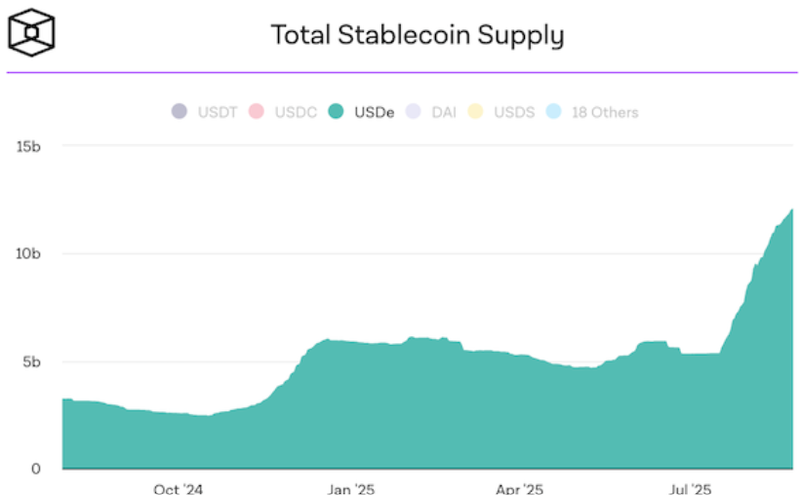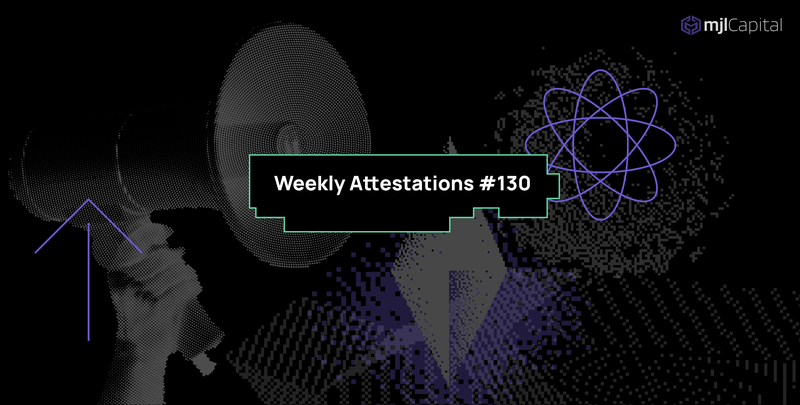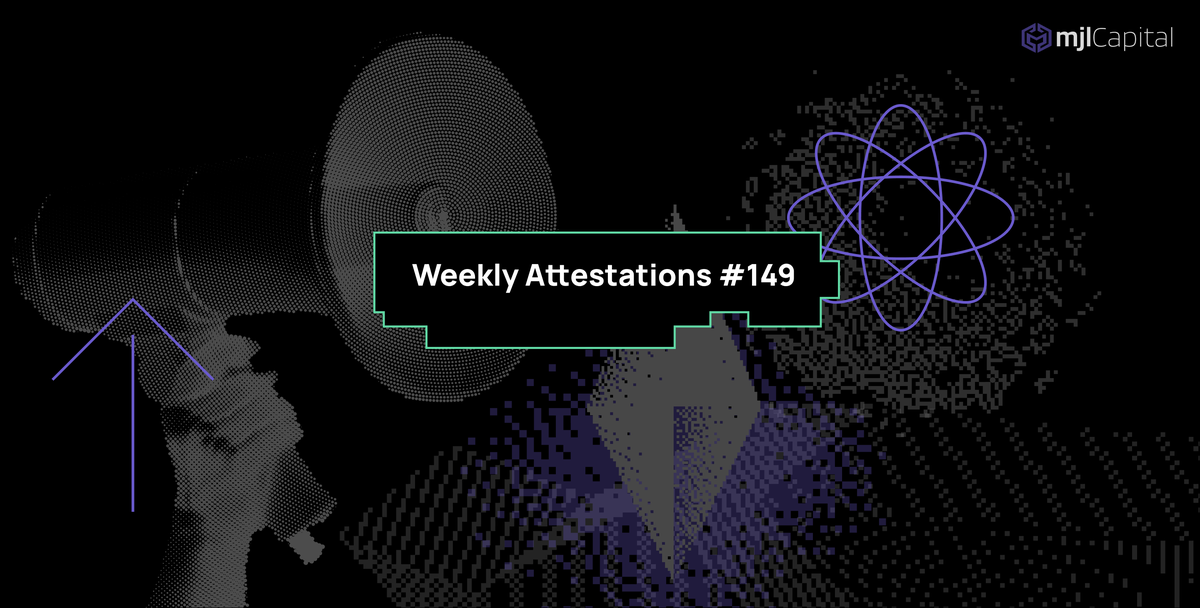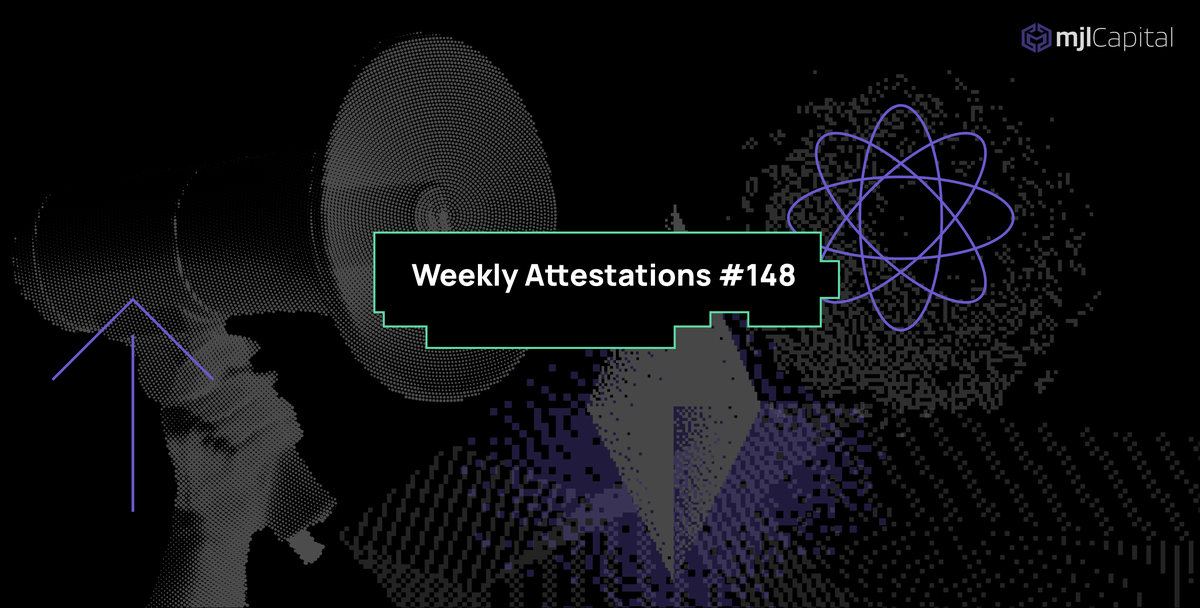Top Stories
Ethena’s USDe Supply Surges Past $12B, Fueled by Yield Loops
Ethena’s yield-bearing stablecoin USDe has hit $12 billion in supply, surpassing 15% of USDC’s float and solidifying its position as a challenger to USDC and USDT. The appeal comes from its 9–11% APY, generated through delta-neutral strategies that pair ETH/BTC collateral with short futures to capture positive funding rates. Much of the growth is amplified by leveraged yield loops: users stake USDe as sUSDe, tokenize it on Pendle, then use Aave to borrow more USDe, creating reflexive compounding cycles. This has locked substantial supply in Pendle and Aave, driving rapid expansion but also raising sustainability concerns. Should funding rates turn negative or market conditions shift, the leverage-heavy ecosystem could face risks similar to past DeFi booms and busts.

Source: DeFiLlama
Heaven Launchpad Gains 15% Market Share in First 10 Days
Solana’s new launchpad Heaven has quickly captured 15% of the token launch market since going live on August 15, averaging about 4,100 launches per day and peaking near 9,000 by day five. The platform generated over $3.8 million in fees in its first 10 days, leveraging a novel “virtual liquidity” system that seeds each pool as if with 35 SOL, allowing tokens to trade immediately on its in-house AMM. Heaven charges 1% fees on sub-$100K market cap tokens, tapering to 0.25–0.5% once projects grow, with revenue routed entirely into buybacks and burns of its LIGHT token. LIGHT’s market cap soared from $15 million at launch to $130 million within a week before retracing to $40 million, highlighting both the early excitement and volatility surrounding the new platform.

Source: Dune
Google Cloud Pilots Universal Ledger for Financial Institutions
Google Cloud is developing Universal Ledger (GCUL), a compliance-focused blockchain tailored for financial institutions, according to Web3 strategy head Rich Widmann. GCUL supports Python-based smart contracts and is designed as a high-performance, credibly neutral Layer 1 network, allowing any financial institution to build programmable payments and asset management tools. Unlike fintech competitors like Circle or Stripe, GCUL aims to be institution-agnostic, with Widmann noting that players like Tether and Adyen could both build on GCUL without competitive conflicts. Currently in private testnet, the project has sparked debate since its permissioned structure raises questions over whether it qualifies as a true decentralized blockchain. Google Cloud has already partnered with CME Group to pilot GCUL for wholesale payments and tokenization use cases, suggesting that the platform is being positioned as institutional infrastructure for the next wave of blockchain-based finance.
Regulation
Crypto Industry Pushes Back on Senate Bill
A coalition of 114 crypto companies and tech groups, including Coinbase, Grayscale, Solana Labs, and Andreessen Horowitz, warned the Senate they will not support its market structure bill unless it explicitly shields developers from criminal liability. The letter argues that decentralized software should be treated like neutral infrastructure and criticizes the recent conviction of Tornado Cash co-founder Roman Storm under money transmitter laws. Industry leaders say that without explicit protections, the legislation risks stifling innovation and driving blockchain development abroad.
U.S. Government Publishes Macroeconomic Data On-Chain
The U.S. government has begun releasing official macroeconomic indicators like GDP and PCE on public blockchains for the first time, marking a major step toward on-chain data transparency. Using Chainlink and Pyth oracles, the Bureau of Economic Analysis now distributes this data across multiple networks including Bitcoin, Ethereum, Solana, Base, Avalanche, Arbitrum, and Optimism. To ensure integrity, cryptographic hashes of the reports are anchored onchain, though traditional release methods remain in place. The rollout was facilitated by Coinbase, Gemini, and Kraken, which helped the Commerce Department purchase crypto for blockchain gas fees. Commerce Secretary Howard Lutnick framed the move as part of President Trump’s broader pro-crypto push, calling blockchain publication a tool for global transparency. This initiative builds on wider federal adoption efforts such as support for stablecoins and blockchain-driven cost-cutting in government operations.
Trump Media, Crypto.com Reveal $6.4 Billion Cronos Treasury Plan
Trump Media, backed by President Donald Trump, is partnering with Crypto.com to create a $6.4 billion Cronos (CRO) treasury, representing nearly 19% of the token’s supply. The initiative includes staking CRO through Crypto.com’s custody platform and integrating it into Truth Social and Truth+ as a utility and rewards token, with users able to convert in-app “gems” into CRO and eventually pay for subscriptions. Positioned as one of the largest digital asset treasuries to date, the plan boosted CRO’s price 29% and builds on Trump Media’s earlier $2 billion Bitcoin treasury strategy.
CFTC Opens Door for Binance and Other Foreign Crypto Exchanges
The CFTC issued new guidance clarifying that foreign crypto exchanges can legally serve U.S. customers if they register under its foreign board of trade framework. The move, described by Acting Chair Caroline Pham as ending “regulation through enforcement,” offers firms like Binance and Bybit a pathway back into U.S. markets after years of restrictions. Exchanges must meet standards on trading rules, financial integrity, and regulatory authorization in their home jurisdictions. While industry lawyers noted the rules have technically existed for over a decade, the clarification is seen as a major step toward expanding U.S. access to global crypto derivatives trading.
Over 90 Crypto ETFs Await SEC Approval, Led by XRP and Solana
The SEC now has 92 crypto ETF applications on its desk, spanning major altcoins like XRP, Solana, and Litecoin to meme tokens such as Bonk and Trump’s official coin. Analysts expect approvals as early as October, with Bloomberg’s James Seyffart giving near-certainty to XRP, Solana, and Litecoin ETFs this year. While ETFs for Dogecoin, Cardano, Polkadot, Hedera, and Avalanche also have strong approval odds, experts warn many products could eventually shutter due to weak inflows, leaving only a few large assets mature enough to sustain long-term ETF demand.
Other Domestic Regulation Updates
- Strategy buys 3,081 more bitcoin for $357 million
- New ETF Filings Hint at Broader Crypto Product Boom Ahead
- Eliza Labs sues Elon Musk's X over alleged anticompetitive actions
- Galaxy, Jump, and Multicoin reportedly seek $1 billion to create a Solana treasury firm
- Canary Files for 'American-Made' Crypto ETF—Will XRP, Solana and Cardano Make the Cut?
- CFTC to Surveil Crypto, Prediction Markets Using Nasdaq Platform
Other International Regulation Updates
- A Philippine lawmaker proposes a 10,000 BTC strategic reserve
- Aave Labs launches Horizon, offering institutional borrowing against tokenized RWAs
Pain & Gain
Pain
- Bitcoin at risk of further decline amid leverage peak and 'huge' Ethereum rotation
- Kanye West's YZY token crash leaves over 50,000 wallets with losses
- 'Red September' Is Coming—Here's What to Expect From the Bitcoin Market
Gain
- Standard Chartered says ETH and ETH treasury firms are undervalued
- Ethereum onchain volume tops $320 billion in August, highest since mid-2021
- Strategy Investors Drop Lawsuit Over Bitcoin Profitability Promises
- Ethena’s USDe Outperforms as Stablecoin Market Surpasses $280 Billion
- HYPE Hits New All-Time High as Hyperliquid Dominates DeFi Revenue
- Jupiter Lend Attracts $500 Million in TVL as Onchain Lending Hits All-time High
Important Legal Notices
This reflects the views MJL Capital LLC (“MJL”), but it should in no way be construed to represent financial or investment advice. Nothing in this correspondence is intended to constitute or form part of, and should not be construed as, an issue for sale or subscription of, or solicitation of any offer or invitation to subscribe for, underwrite, or otherwise acquire or dispose of any security, including any interest in any private investment fund managed by MJL. Any such offer may only be made pursuant to a formal confidential private placement memorandum of any such fund, which may be furnished to potential investors upon request and which will contain important information to be considered in connection with any such investment, including risk factors associated with making any investment in any such fund. Further, nothing in this correspondence is, or is intended to be treated as, investment or tax advice. Each recipient should consult their own legal, tax and other professional advisors in connection with investment decisions.
Domenic Salvo is a Managing Partner at MJL Capital, helping lead Portfolio Research and Investor Relations.




